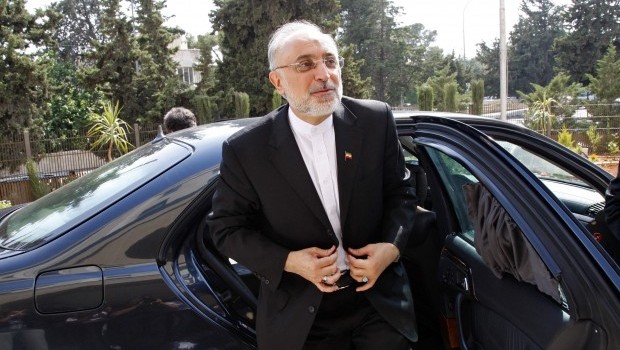
Iranian foreign minister Ali Akbar Salehi arrives at the official opening ceremony for the new headquarters of the Iranian embassy in Amman on May 7, 2013 (REUTERS/Majed Jaber)
The response following remarks by US secretary of state John Kerry and French Foreign Ministry spokesman Philippe Lalliot on the Iranian electoral system, criticizing the recent disqualification of many candidates from Iran’s forthcoming presidential election by the country’s Guardian Council, which vets all candidates for national elections.
On May 24, US secretary of state John Kerry, speaking to reporters during a visit to Tel Aviv, said: “I can’t think of anybody in the world looking at Iran’s election who wouldn’t be amazed by a process by which an unelected Guardian Council, which is unaccountable to the Iranian people, has actually disqualified hundreds of candidates—potential candidates—according to very vague criteria, which the Iranian people are not privileged to know or judge by.”
He added: “That is hardly an election by standards which most people in most countries judge free, open, fair and accessible, accountable elections.”
In a response to John Kerry’s claims, Iranian foreign minister Ali Akbar Salehi said on Saturday: “It would be in Washington’s interest to conform to international law and to stop meddling in the internal affairs of other countries. The US should accept that every country has its own electoral process, which is based on the country’s legal system.”
He also made reference to the Algiers Accords, which the US and Iran signed in 1981, in which the US agreed not to interfere in domestic Iranian affairs.
The Iranian foreign minister also accused Washington of hypocrisy in its criticism of Iran, saying: “Public opinion will never forget the US officials’ unconditional support for the dictators who were toppled during the Islamic Awaking [Arab Spring] until the last minute.
“If they are concerned about the people’s rights and democracy, why did they disregard the results of the 2006 Palestinian Legislative Council elections and condoned the Israeli regime’s apprehension and abduction of Palestinians’ democratically elected legislators and acts of aggression against the Gaza Strip?”
Iran also responded to criticism from France, after French Foreign Ministry spokesman Philippe Lalliot also criticized Iran’s electoral process last Wednesday, saying that the Iranian people should be allowed to “freely choose” their leaders.
In a statement released on Saturday, Iranian Foreign Ministry spokesman Seyyed Abbas Araqchi advised French authorities “to avoid interfering in the domestic affairs of other countries” and urged them “to concentrate on their own internal problems instead.”
Araqchi pointed out the high voter turnout in all previous Iranian elections, and said such a trend indicates the “deep-rooted” status of democracy in Iran.
Iran’s presidential election in scheduled to begin on June 14. The Iranian Interior Ministry released a list of eight candidates that the Guardian Council had approved to run in the election, out of a total of 686 people who had registered for the poll.
